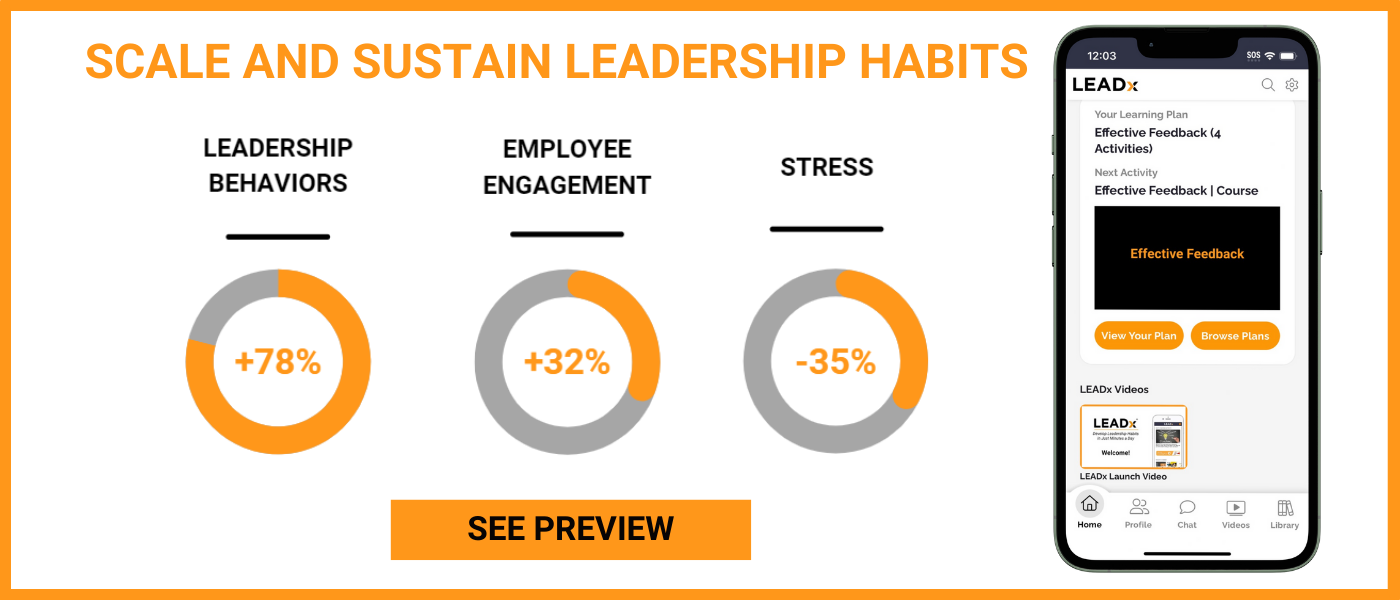
Apparently, it’s easy to find fault with your boss. Executive coaches at LEADx routinely hear about micromanagement, lack of support, lack of recognition, poor communication, infrequent one-on-ones, rude behavior, and so on.
 But before we pass judgment, it’s essential to recognize that bosses are human, too—with their own challenges and stressors. In fact:
But before we pass judgment, it’s essential to recognize that bosses are human, too—with their own challenges and stressors. In fact:
- 53% of managers feel burned out at work, according to Microsoft’s Work Trend Index
- Managers’ stress is far greater than that of individual contributors, according to Gallup
- Researchers at Columbia found that 18% of managers suffer from depression
In many cases, it’s not that managers don’t want to be better leaders but that circumstances and limitations are beyond their control.
The “Perfect Boss” Myth
When people criticize their boss, they often compare them to an idealized version of leadership. They want perfect behaviors all of the time. But your manager isn’t a robot, isn’t a God–they are human (flawed by definition) working in an (imperfect) environment.
What shapes your manager’s behaviors?
There are four primary factors that determine what your boss does, or doesn’t do:
- Personality
- Motivators (internal and external)
- Experience and training
- Stressors
Personality Matters: Strengths as Weakness
One of the most significant factors influencing a boss’s behavior is their personality. Many managers are promoted because they excel in their individual roles—not because they’re inherently suited to lead others. Consider the following traits:
- People who are high in conscientiousness are great with quality, organization, and details; they can also then be prone to micromanagement
- People who are highly agreeable are great at building relationships but might shy away from giving feedback or resolving conflict.
- People who are high in extroversion might have energy and charisma but not listen very well.
It’s possible that your boss has a personality better suited to individual work but was thrust into management due to company needs. This doesn't mean they aren’t trying or that they don't care. Instead, it may reflect a mismatch between their natural tendencies and the demands of managing a team.
Experience and Training
Another critical factor is the experience and training your manager has received (or, more likely, hasn’t). Unfortunately, many organizations promote high-performing employees into management roles without providing sufficient leadership training.
Has your manager actually been trained in core topics like effective feedback, one-on-one meetings, delegation, accountability, psychological safety, or other drives of employee engagement? Is it their fault they’ve been put into a job without the training or tools to do it well?
Internal and External Motivators
Like personality traits, most adults have relatively fixed values (i.e., internal motivators).
Using the Hogan Values framework, people are higher or lower on motivators like power, hedonism, tradition, and altruism, among other things. Using the Korn Ferry model, people have variations of challenge, independence, etc. These hard-wired internal motivators will dramatically influence one’s leadership style.
Similarly, managers must produce results in the context of where they work. Perhaps a highly agreeable and altruistic leader is getting pressure from above to hit unrealistic quarterly results. Perhaps your leader wants to support your growth and development, but their boss has forbade any investment in developmental opportunities as a distraction. When a boss is stretched thin between these competing priorities, their team might feel neglected.
Stressors and Personal Circumstances
Lastly, it’s essential to remember that your boss is a human being who experiences stress and personal challenges, just like anyone else. Perhaps your manager is dealing with a family health issue, or had a fight with their spouse, or is just hungry and tired.
While it’s important for leaders to manage their stress, employees should also strive for **understanding and compassion**—recognizing that their boss is balancing their own pressures both inside and outside the workplace.
Moving from Complaints to Understanding
Does this mean that bad bosses shouldn’t strive to improve? Absolutely not. Every leader should work toward becoming more supportive, communicative, and effective in their roles. However, employees can also shift their perspective—from constant complaints to understanding the human behind the role.
This shift in mindset can lead to better communication and collaboration between employees and managers. When employees understand the pressures their boss is facing, they might approach challenges more patiently or suggest solutions that acknowledge the manager’s constraints. In turn, this can lead to a more positive working relationship and foster a workplace where both managers and employees can thrive.
EQ and Managing Up
One of the four core emotional intelligence skills is social awareness or empathy. At the end of the day, it’s important to remember that bosses are not superheroes—they’re just people, often doing the best they can in complex and stressful environments.
By recognizing the influence of personality, motivators, experience and training, and stressors on their behavior, you can develop a more nuanced view of your leader. This understanding is key to building a healthier, more productive workplace where both employees and managers can succeed together.
So, before you complain about your boss, take a moment to consider the bigger picture—and maybe, give them a break.






